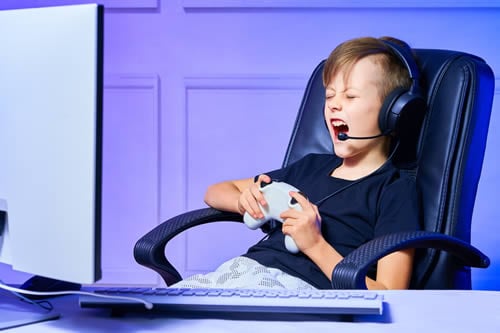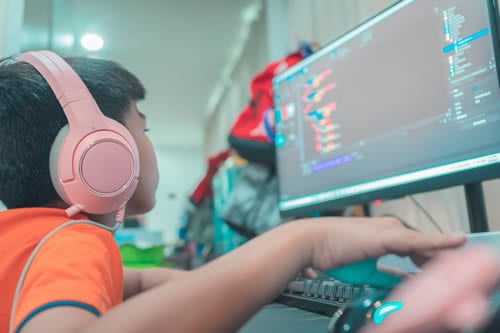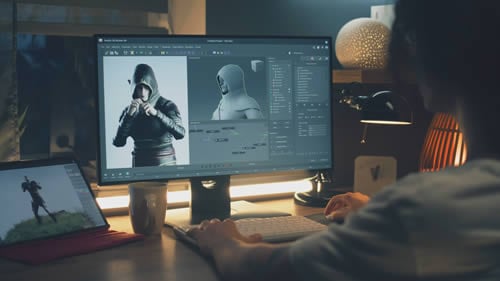Like many innovative ideas, Dan Clark’s enterprise started with a ‘What if…?’ Having worked in a school for many years teaching IT and music, he often chatted about computer games to his students as a way of making them feel at ease. “Their eyes would light up but then we’d have to get back to learning and the enthusiasm was lost,” he recalls. “I began to wonder if there was a way of harnessing that interest as a way of helping kids.”
This curiosity led him during lockdown to set up ‘MindJam’, an organisation which offers one-to-one, online mentoring for young people with special needs such as autism, ADHD, anxiety or social, emotional and mental health issues. Dan – who is also the father of two kids with autism – now has a team of thirty-five mentors who work with children all over the UK and other parts of the world, offering gentle support and friendship through a shared love of computer games.
Gaming can be a Low-Key Way to Build Relationships

Playing games online with a mentor, he says, offers children a fun, low-stress way of building up trust and self-confidence. “There’s no one coming to the house and they don’t have to show themselves on screen if they’d rather not,” he explains. “They’re in control and there’s no pressure for eye contact or to talk about anything except the game. It’s like play therapy but with a bit of learning.”
Although there are goals that have been agreed upon with parents before working together – to encourage a refuser back to school, for example – mentors follow the child’s lead, working at their pace. Much of the work lies in boosting a child’s self-esteem. “We might discuss emotions by asking how a character’s feeling,” Dan points out. “We might also ‘act dumb’ and pretend we don’t know how to do something in a game so that the child teaches us and feels good about themselves.”
Gaming Builds Skills

Despite the sometimes negative perception of the general public, gaming has many positives, he maintains. “It has been shown to expand brain matter and improve coordination and social skills,” he says. “Some games are relaxing, almost meditative, and take your mind off your troubles. Other games, such as ‘Roblox’, promote business skills which is great for young entrepreneurs.”
One girl who worked with MindJam, he recalls, was a selective mute and loved horses. Playing the game ‘Red Dead Redemption’, she was able to develop horse trails and had twenty other gamers following her. This boosted her belief in her own creativity and leadership skills.
Families might worry about the potential for gaming addiction, Dan admits. “I’ve found that saying, ‘Gaming is bad,’ is presenting the problem in the wrong way. You’re telling the child, ‘What you love is bad for you’. We talk it through with them and say instead, ‘Look, I love gaming as well but you do need to step away from it sometimes, have conversations with people or get some fresh air’. Because the child has built-up trust with the mentor, we find they listen more. We also suggest parents have a look at the games their child is playing and what they’re learning,” he adds. “It’s about educating both sides.”
Boosting Job Prospects

For children who are keen to develop new skills, mentors can also offer encouragement to learn different aspects of game design to help with future employability. “Gaming is a huge entertainment industry. It’s not just about coding,” Dan suggests. “There’s music, story-writing and animation as well.
“I’ve been working with one young man, for example, who has brain damage,” he continues. “To start with, he had no confidence and couldn’t talk to anyone outside his own family so we just played games together. More recently, I’ve been teaching him game design – he’s now started going to school part-time and is planning to take his GCSEs. He’s gone from being completely unconfident to hoping that he can do a college course in the future.”
All MindJam’s mentors are fully vetted and have experience working with youngsters with special needs through counselling, care work or teaching. Some also work in the games industry and others are themselves neurodivergent. Most importantly, however, they must all have a genuine enthusiasm for gaming. “A lot of our mentors are thrilled to discover that a job like this exists,” Dan laughs. “It combines everything they love!”




